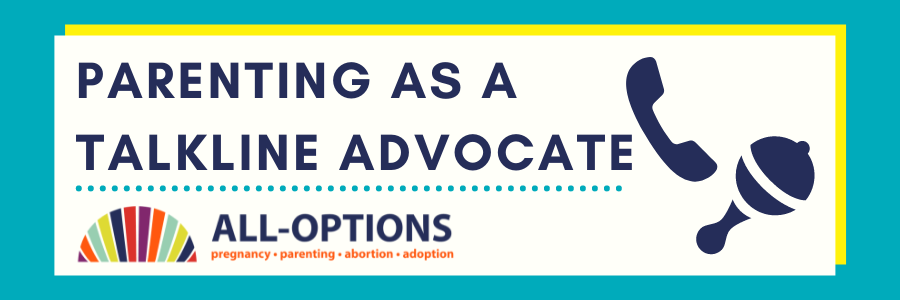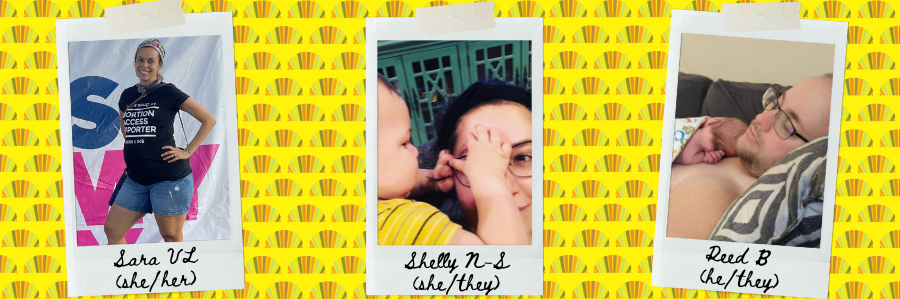On our All-Options Talkline, we provide open-hearted support to people through their reproductive journeys while disrupting the stigma that comes with many of these decisions. For many of our volunteers, navigating their own complex parenting and pregnancy journeys means they understand the emotions callers may feel.
We recently spoke to three Talkline Advocates about what it means to provide a judgment-free listening ear to callers, while also being pregnant and/or parenting. Read on to learn what they have to say.
Don’t forget applications to join our Spring 2022 Talkline training close on Friday, February 11 at 11:59pm ET. For more information, click here and submit an English or Spanish application.
First things first! What led you to become a Talkline Advocate and how long have you been volunteering?
Sara VL (she/her): I am staunchly pro-choice! I became a Talkline Advocate because I wanted to get involved helping people navigate pregnancy decisions in a way that was non-judgmental and equip them with more information and resources to feel supported along the way. I’ve been volunteering since Spring 2019.
Shelly N-S (she/they): I had been in the reproductive justice sphere for a long time, but was looking for a way to volunteer that was compatible with my chronic pain disorder. All-Options was the perfect way to support people from an inclusive reproductive justice lens. I’ve also been a Talkline Advocate since Spring 2019!
Reed B (he/they): One of my passions is reproductive justice, especially for LGBTQ+ folks in the South(ern US) so that led me to get involved with All-Options in the Spring of 2020.
What has it been like to be on the Talkline while pregnant and/or parenting?
Sara: Being pregnant makes me even more pro-choice. It’s such an intense experience physically, emotionally, financially and socially, it should always, always be a choice.
Shelly: I thought that I was already a person with fairly high empathy, but being pregnant and parenting on the Talkline has taken it to another level. It’s a weird mix between a protective instinct towards our callers of just deeply wanting them to be safe and happy, combined with a feeling of connection through shared experiences.
Reed: Both of these things are true now! It’s been a deeper emotional experience for me.
Has being pregnant and/or a parent changed your experience as a Talkline Advocate? How so?
Sara: Being a Talkline Advocate while pregnant makes me more acutely aware of the pain of those callers who want to end a pregnancy and can’t (F you Texas) and those who had a miscarriage for a wanted pregnancy. The skills are the same, listen attentively, help process feelings of anger and frustration, and remind them to be kind to themselves. They are doing the best they can.
Shelly: Being pregnant, and then being a parent, as a Talkline Advocate has increased my awareness of my own reactivity and biases—not in a sense of judging our callers (never) but in a sense of more frequently checking in with myself to make sure that I’m not basing any of my responses to our callers on my own experiences, but rather reflecting back to them and using our best practices. I think it’s also made me a better practitioner of self-care—I can only tell our callers to treat themselves gently so many times before I have to start practicing what I advocate!
Reed: I’m grateful that I’ve been able to add these complex layers to my experience! Being able to see and feel fertility/pregnancy/parenting in this way reinforces all the joy and challenges of these roles. It’s very possible to be trying to conceive, pregnant, parenting, and/or any other status and to hold space for someone who’s navigating all of their options such as pregnancy, parenting, abortion, adoption.
Last, what is your favorite part about being a Talkline Advocate?
Sara: My favorite part is being able to connect with people and offer support that they have not been able to find anywhere else, e.g. normalizing their feelings, letting them know that they are not alone and reminding them to be kind to themselves.
Shelly: I love being able to provide an unconditional safe space for our callers. Even if it’s only for the duration of one call, we provide a person who won’t judge them, who puts them first, and who gives them space to feel whatever they’re feeling, without an agenda.
Reed: My favorite part is being able to do care work and hold space.

